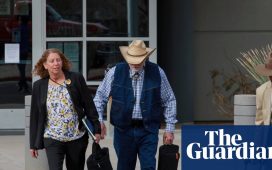Immigrant rights groups worry Colorado’s Latino communities are not getting the services or information they need to slow the spread of COVID-19, putting themselves and other Coloradans at risk.
“We have to remind each other about folks who remain invisible. There’s a lot of discussion about the most vulnerable,” said Victoria Gómez Betancourt, a Venezuelan immigrant. “We know that age is a factor; we know that a compromised immune system is a factor; underlying health issues are factors. But marginalized communities, they’re going to be impacted differently based on access.”
Gómez Betancourt, a Colorado resident of 20 years, understands that well. She takes care of her 75-year-old mother, who has dementia and no health insurance. Gómez Betancourt is thankful she’s able to work from home and stay with her during the coronavirus pandemic, and she’s trying as hard as she can to maintain an environment for her that limits potential exposure.
“It feels like a ticking time bomb,” she said.
Immigrant rights advocacy groups, including the Colorado Organization for Latina Opportunity and Reproductive Rights, where Gómez Betancourt works, caution that the health and economic effects of the pandemic are exacerbated among Latino communities that often face additional barriers to health care. The most obvious is not finding the information they need in Spanish. But many, particularly immigrants who don’t have legal residency, also face socioeconomic challenges.
There’s also a growing fear among immigrants of using public benefits — even if they are legal residents, because of a Trump administration rule that means doing so could jeopardize their chances to stay in the country permanently.
Both Gómez Betancourt and her mother, Teotiste Betancourt de Gómez, are legal residents, but they haven’t been able to get her mother insurance, partly because of that fear.
Paula Scheidegger, a nurse and practice manager at Telluride Regional Medical Center, sees the barriers every day as she works to make sure the Latino community in her area understands how to prevent the pandemic, what the symptoms look like and how to get treatment.
Scheidegger, a Colombian immigrant, takes that responsibility seriously even though her clinic is one of only two in San Miguel County and it has been inundated with patients. The clinic is working closely with the county health department.
“They’re scared,” Scheidegger said. “There’s mixed information, and they don’t know where to go.”
COLOR, based in Denver, has been urging state officials to make information and resources accessible to Latino immigrants.
Most of the information listed on the Colorado Department of Public Health and Environment’s webpage on the coronavirus is in English, though press releases are translated into Spanish and the call line provides answers to questions in Spanish. Media briefings haven’t had other language translations, but they have included an American Sign Language interpreter. The governor has also distributed messages on Twitter in Spanish and spoken to Spanish-language TV.
“The governor’s priority right now is to continue to keep all Coloradans safe and healthy no matter what language they speak, and in order to do that, we need to communicate to all Coloradans across the state in a swift and timely manner and keep them up to date with the latest information,” said Conor Cahill, Gov. Jared Polis’ spokesperson. The state welcomes help from nonprofits in communicating the messages, he said.
COLOR has created a resource guide with bilingual information, hosts its own Spanish radio show called “Mujeres de COLOR” that’s also available on Facebook and works with a publication called El Semanario that produces English- and Spanish-language articles. The nonprofit is also helping other groups facilitate access to food and other supplies for Latino immigrants who have lost jobs and wages during the pandemic.
But advocates say more needs to be done. More than a fifth of Colorado’s population is Latino, and if Latino communities are at risk, so is the broader population.
COLOR is advocating for paid sick leave and emergency wage support for all workers. The group commends the governor’s order requiring employers to pay sick leave while workers are getting tested for coronavirus, but advocates want that to also include pay for forced time off due to closures.
The group also wants free coronavirus testing and medical services related to COVID-19 to be covered for all Coloradans, including those who are uninsured. Latinos are more likely than any other any racial or ethnic group in the state to be uninsured with 10.2% of Latino families lacking coverage in 2016, according to data from the Colorado Health Policy Coalition.
“If we fail to act, we know Coloradans will forego needed testing and treatment, which will only intensify and prolong the outbreak,” COLOR said in a statement.
In Telluride, the problems are intensified by the fact that many depend on tourism and the ski resorts for work or other seasonal or low-wage jobs. With all of that shut down, many Latino workers don’t have income coming in. It’s a remote, expensive area where the nearest Walmart is 65 miles away, Scheidegger said. Oftentimes, families are living in crowded homes, sometimes 10 to a two-bedroom apartment — not conducive to social distancing.
“These people are not prepared,” she said. “They live paycheck to paycheck. … The reality is every time I talk to a family, they are so scared. They don’t speak the language. (Some) are undocumented.”
Scheidegger is working with the countywide Latino Advocacy Committee in the hopes that they can help families with rent money, medications, food, baby formula and other necessities, particularly because all county residents are currently required to shelter in place. They do, at least, have access to testing.
Advocates just have to keep getting the word out.
Join our Facebook group for the latest updates on coronavirus in Colorado.







